

We have the tools and technology to work less and live better. In 1930, a year into the Great Depression, John Maynard Keynes sat down to write about the economic possibilities of his grandchildren.
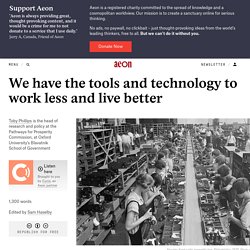
Despite widespread gloom as the global economic order fell to its knees, the British economist remained upbeat, saying that the ‘prevailing world depression … blind[s] us to what is going on under the surface’. In his essay, he predicted that in 100 years’ time, ie 2030, society would have advanced so far that we would barely need to work. The main problem confronting countries such as Britain and the United States would be boredom, and people might need to ration out work in ‘three-hour shifts or a 15-hour week [to] put off the problem’. At first glance, Keynes seems to have done a woeful job of predicting the future. In 1930, the average worker in the US, the UK, Australia and Japan spent 45 to 48 hours at work. If we wanted to produce as much as Keynes’s countrymen did in the 1930s, we wouldn’t need everyone to work even 15 hours per week. Cold Hard Truths About The Workplace I Learned The Hard Way.
Have you ever been let down by a colleague who you thought was a friend?
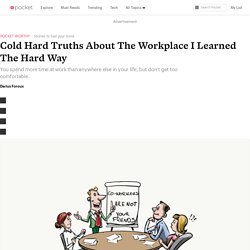
Or how about getting drunk at the office party? If so, you’re not alone. But here’s the thing: You can’t mix your professional and personal life. When Work and Meaning Part Ways. Morning Lift (detail), 2018, by Peter Ravn; courtesy of the artist.
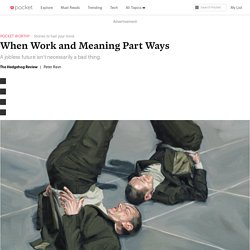
The American work ethic is built on a promise: Work hard, and you’ll earn more than just money. You’ll earn social dignity, moral character, even spiritual purpose. Great Teams Are About Personalities, Not Just Skills - Harvard Business Review - Pocket. At the start of 2016 Google announced that it had discovered the secret ingredients for the perfect team.
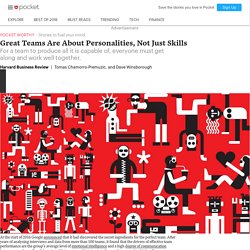
After years of analyzing interviews and data from more than 100 teams, it found that the drivers of effective team performance are the group’s average level of emotional intelligence and a high degree of communication between members. Google’s recipe of being nice and joining in makes perfect sense (and is hardly counterintuitive). Perhaps more surprising, Google’s research implies that the kinds of people in the team are not so relevant. While that may be true at Google, a company where people are preselected on the basis of their personality (or “Googliness”), this finding is inconsistent with the wider scientific evidence, which indicates quite clearly that individuals’ personalities play a significant role in determining team performance. In particular, personality affects: Having a bad job can be worse for your health than being unemployed.
A new study by The University of Manchester has found that people employed in low-paying or highly stressful jobs may not actually enjoy better health than those who remain unemployed.
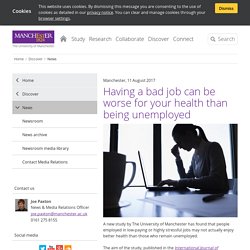
The aim of the study, published in the International Journal of Epidemiology, was to examine the association of job transition with health and stress. The researchers were particularly interested in comparing the health of those who remained unemployed with those who transitioned to poor quality work, and examining whether the health impacts of good or poor quality jobs. The study monitored over 1000 participants aged 35-75 who were unemployed during 2009-2010, following up with them during the next few years about their self-reported health and their levels of chronic stress as indicated by their hormones and other biomarkers related to stress. Should You Quit Your Job? When To Leave And When To Stick It Out. Photo by Andy Lee.
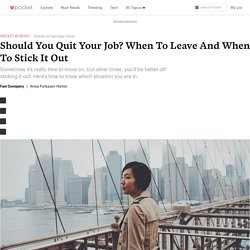
But there are other times when the answer to “should I quit my job?” Is a lot less clear. After all, work isn’t fun 100 percent of the time. Even those of us lucky to have our dream jobs probably have tasks and responsibilities that we’d really rather not do. And growing in our career sometimes involves weathering through some challenging times.
The hidden tactic overloaded workers are using to catch up - BBC Worklife. ‘I would like to make a good impression’ “If you’re feeling insecure, you’re going to make sure you’re working all the time and you’re indispensable,” says Cooper.
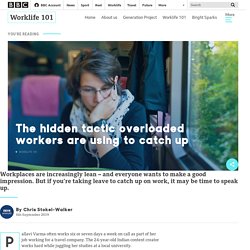
“You’re going to send emails at night, working at night. You’re not going to take as much holiday time or if you do take a holiday, the family go on the holiday but the parents, both men and women, are working by the pool.”
Young People Are Going to Save Us All From Office Life. Some employers aren’t comfortable giving people autonomy over where and when they work.

Let’s Hear It for the Four-Hour Working Day. ‘A culture that doesn’t allow for rest is self-defeating.’
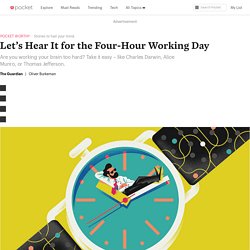
The Myth of the Skills Gap. The contention that America’s workers lack the skills employers demand is an article of faith among analysts, politicians, and pundits of every stripe, from conservative tax cutters to liberal advocates of job training.
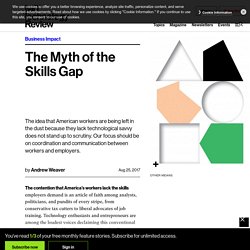
Technology enthusiasts and entrepreneurs are among the loudest voices declaiming this conventional wisdom (see “The Hunt for Qualified Workers”). Two recent developments have heightened debate over the idea of a “skills gap”: an unemployment rate below 5 percent, and the growing fear that automation will render less-skilled workers permanently unemployable. Proponents of the idea tell an intuitively appealing story: information technology has hit American firms like a whirlwind, intensifying demand for technical skills and leaving unprepared American workers in the dust. The mismatch between high employer requirements and low employee skills leads to bad outcomes such as high unemployment and slow economic growth.
Want more engaged employees? Start optimizing their leisure time. iStock As our world becomes more and more automated, it’s becoming less and less human in the process. To Be Happier at Work, Invest More in Your Relationships. Executive Summary Research across organizations and industries shows that our understanding of what leads to professional satisfaction is often misplaced. Many of us strive for a meaningful job, an impressive title, or a sizable salary at the ideal company. In doing so, we drastically undervalue the importance of relationships, even though extensive research shows that it’s people, not the perfect job, that lead to fulfillment. In interviews with a diverse group of 160 people from a range of industries and positions, researchers found that flourishing in your career depends as much on your relationships, both in and out of work, as it does on your job itself.
People whose work is mundane or demanding are just as likely to feel satisfied and fulfilled as those with fun or inspiring jobs if they proactively invest in relationships that nourish them and create a sense of purpose. How to Break Your Addiction to Work. For many of us, working simply feels good. But just because it feeds your ego or makes you feel important, that doesn’t mean it’s actually good for you. How do you break the cycle of working long hours at the office and constantly checking email at home? I was a fast-food worker. Let me tell you about burnout. How WeWork Has Perfectly Captured the Millennial Id - The Atlantic - Pocket. Geoffroy de Crécy In March 2017, the New York City–based editors and writers of The Atlantic moved to a WeWork office in Brooklyn. What Anxiety Does to Us at Work. Executive Summary Anxiety can cause you problems at work. Offices Can Be Hell for People Whose Brains Work Differently.
Retiring Retirement - Nautilus - Pocket. Leave the Office on Time and Don’t Take Your Work Home - Darius Foroux - Pocket. These two lessons are true for every person who wants a long, happy, and satisfying career. How To Get a Skilled Trades Job. How to Be More Productive by Working Less - Mark Manson - Pocket. It took me 18 months to write The Subtle Art of Not Giving A Fuck. Over that time period, I wrote somewhere in the vicinity of 150,000 words for the book (about 600 pages).
S Use of Your Data.
Making Video Games Is Not a Dream Job. So far, progress has been slow. While game workers have become more likely to voice support for unionization on social media and in private gatherings, no major studio in the United States has seen an attempt to organize yet. The Downside of Work-Life Balance - James Clear - Pocket. Why Exhaustion Is Not Unique to Our Overstimulated Age - aeon - Pocket. Is ours the most exhausting age ever? The Unmaking of American Work. I grew up in Silicon Valley, but I was young enough that I don’t have many memories of the first Internet bubble. How Being a Workaholic Differs from Working Long Hours - Harvard Business Review - Pocket. The Software That Shapes Workers’ Lives. To Have a Happier Home Life, Treat It a Little More Like Work.
The Religion of Workism Is Making Americans Miserable. There is nothing wrong with work, when work must be done. And there is no question that an elite obsession with meaningful work will produce a handful of winners who hit the workist lottery: busy, rich, and deeply fulfilled.
Neuroscience Is Going to Change How Businesses Understand Their Customers. Executive Summary. Why Freelancing Creates Anxiety About Money. The political case for more free time. Lessons from not checking my email messages for a month. The Four ‘Attachment Styles,’ and How They Sabotage Your Work-Life Balance. Why Americans and Britons work such long hours - Free exchange. New Office Hours Aim for Well Rested, More Productive Workers. Post-Work: The Radical Idea of a World Without Jobs - The Guardian - Pocket. No boss? No thanks. Why managers are more important than ever. No boss? No thanks. Why managers are more important than ever. WeWork rebrands to We Company, reveals details of SoftBank deal. Why companies are still designing open plan offices.
Being a Go-Getter Is No Fun - The Atlantic - Pocket. What the Best Mentors Do - Harvard Business Review - Pocket. Buzzfeednews.
Did a slave make your sneakers? The answer is: probably. How employers have gamified work for maximum profit. - The Washington Post. One Thousand Years of Labor. Staying Focused in a Noisy Open Office. How Employers Track Their Workers. Qz. A Working Class Death. I Didn’t Become a Stay-at-Home Mother for My Kids. I Did It for Me. 9 Out of 10 People Are Willing to Earn Less Money to Do More-Meaningful Work.